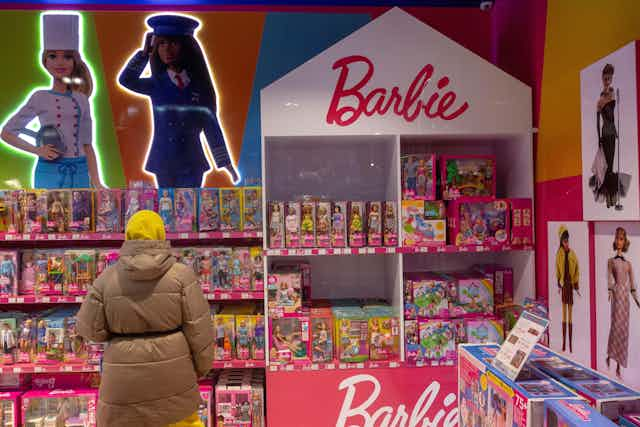Underground screenings of the summer’s Hollywood blockbuster Barbie are now being shown around Russia, despite the film being frowned on by government officials.
The fantasy comedy film, starring Ryan Gosling and Margot Robbie, is being shown at some Russian cinemas as well as other venues. Some places are using pirated copies with bad voiceovers. However, the film has been criticised by officials and other pro-government voices as not conforming with “Russian values”.
The movie is based on the American doll produced by Mattel since the late 1950s. Some reviewers argue that the film promotes self-acceptance, inclusivity and female empowerment.
Perhaps not surprisingly, these values stand in stark contrast to the Russian government’s current world view and beliefs, which seeks to promote conformity and collective, patriotic ideals. In 2022, the Russian ministry of culture proposed a list of traditional spiritual and moral values for the Russian people, which included “patriotism” and “service to the Fatherland”.
Given this position, it is not surprising that one St Petersburg newspaper article argued that the film should be banned because it promotes an aggressive denial of “family values” and discrimination against men.
From the Kremlin’s viewpoint, the conflict between Russian and western values is part of a “hybrid war” the west is waging on Russia. The claim here is that the west is trying to penetrate Russia’s information space in order to influence Russian citizens and exploit the “protest potential of the population,” as Russian chief of general staff Valeri Gerasimov warned.
Read more: Greta Gerwig’s Barbie movie is a 'feminist bimbo' classic – and no, that's not an oxymoron
Information from the west is now considered a threat to Russia, just as it once was in the Soviet era. It is only logical, therefore, for the government to try and prevent not only western films from entering Russia’s information space, but also to censor Russian-made films that do not echo the Russian government’s stated ideals and values.
From the Kremlin’s perspective, it is better to prevent information flow, rather than deal with the consequences. The Kremlin often refers to the Arab Spring, the Orange Revolution in Ukraine in 2004 and the Euromaidan protests in 2014 as products of western influence.
To avoid these kind of uprisings one week after the beginning of the war in Ukraine, Russia restricted access to numerous western media, such as the BBC. The increasingly tight controls on information have led independent journalists to leave Russia.
Barbie breaks through
There are several possible explanations that may have contributed to the film’s popularity in Russia, aside from a simple desire to see a globally popular piece of entertainment.
Although there is no hard evidence of the movie’s influence on Russian viewers, it is worth noting that the Russian population is not homogenous in its views. This is especially true concerning sensitive topics such as the war in Ukraine and the influence of western culture.
The country’s sanctions and government regulations allow limited access to western products, such as Starbucks and McDonald’s. This is also the case for western technologies, including those that have become commonplace in other parts of the world.

Some segments of society may see viewing the movie or buying Barbie-pink items in shops as an act of defiance, a symbol of their refusal to conform to the government’s narrative and divorce themselves from the conformist majority, similar to acts of rebellion during Soviet times.
This is after all a country where people are not allowed to call the “special military operation” in Ukraine a war and journalists can face up to 15 years in prison for publishing “false” information.
After years of geopolitical tensions and the ongoing war in Ukraine, a portion of Russia’s population may also be seeking a respite from the grim reality of living in a country facing digital exclusion – blocking of western news and social media websites – international sanctions, and in some parts of the country, drone attacks.
If nothing else, the reaction to the Barbie phenomenon exposes two important facts: the Kremlin’s sense of insecurity towards the west and the diversity of opinions and desires within Russian society.
Read more: Why Crimean Tatar fighters are playing an increasing role in resistance to Russian occupation

